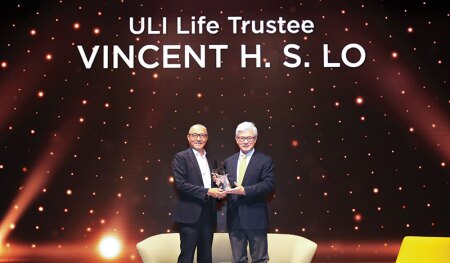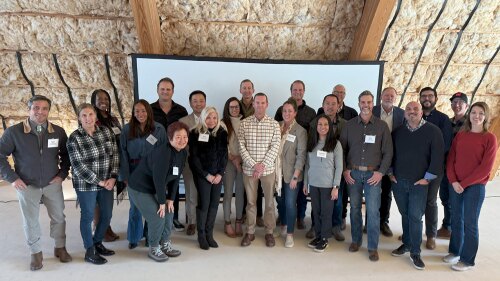Vincent Lo, a longtime supporter of ULI in Hong Kong and China, has been named a Life Trustee, the 20th person so honored and the second in the Asia Pacific region.
Vincent Lo recently celebrated the 50th anniversary of Shui On Group, the real estate company he founded in 1971 at the age of 23. He has been a pioneering developer in China since the 1980s, achieving global fame with Xintiandi, the renovation of a run-down area of Shanghai where the Chinese Communist Party was formed in 1921. Working with architect Benjamin Wood, acclaimed for helping revitalize Boston’s Faneuil Hall, he created an innovative master plan to preserve the historic area, adding high-end retail and making it a model for mixed-use developments across China—and incredibly profitable in the process. According to Forbes, which listed his net worth at $1.65 billion, Lo is the 43rd-richest person in Hong Kong. He talked to ULI about planning and opportunities in China.
UL: How did you first get involved with ULI, and why?
Lo: I was working on a lot of master plan projects in the mainland and realized I didn’t have sufficient knowledge. I was searching, and ULI’s name came up. ULI has been providing good experience, sharing and knowledge sharing amongst the members. I thought, I should join the organization and learn something to help myself in doing all these master plans.
So I joined ULI, and before I knew it, I was sucked into the whole action; ULI is very good at doing that. They bring members in and get them to do a lot of work. I started to involve myself, and my colleagues all started to get involved; the past three chairs of Asia [Pacific] have been employees of Shui On.
I hope I’ve helped ULI establish itself in the Chinese market. I said China is going to be the biggest property market in the world. So ULI can really help the development process and educate a lot of the people in this industry. And I think in the future, ULI can continue to do so much in the Chinese Mainland market.
Let’s talk about your long involvement in China and how Xintiandi (meaning “new heaven and earth”) became a success, hosting APEC in 2001, along with the 80th anniversary of the founding of China’s Communist Party at a historic hall in this very district. Why did you undertake such an ambitious but risky development?
It was in 1996, when the China property market was really in a slump. Luwan district leaders in Shanghai—where I had my first investment in 1985, and where I have my head office building—approached me and said, “We have a big piece of run-down housing area in the heart of Shanghai. Can you help us plan it?”
When I looked at the location, I said, my God, what a site this is, and started to help them work out a detailed master plan. This land in the heart of Shanghai includes the first Congress Hall of the Communist Party. They wanted to preserve the ambience. I thought, what do you do with that stone gate housing, not suitable for modern-day living or working? That was really my biggest hurdle.
In my travels, I visited the SoHo district in New York and Faneuil Hall in Boston; they preserve the past and bring it to modern-day use. So I was thinking, can we do something like that? But there’s not that sort of expertise in the architectural sector in Hong Kong and Shanghai.
At Faneuil Hall, Benjamin Wood was very much involved in the design and planning. So I wrote out of the blue and said, “Mr. Wood, we have a development in Shanghai and because I’m impressed with your work on Faneuil Hall, would you be interested to come and discuss with us whether we can work on that?”
He agreed and flew to Hong Kong. He’d never been to Shanghai or China before. Ben spent weeks walking around Shanghai thinking, what is Shanghai’s old housing like?—what he needed to preserve that would really present the sort of element and characteristic of the stone gate housing.
Ben did a fantastic job with Xintiandi. That’s why it’s won so much recognition internationally. When we launched the project in the middle of 2001, it became an instant success. And the whole area—52 hectares [128 acres] that we had been awarded to develop—it’s now the hottest property asset in Shanghai.
How did Xintiandi impact you, Shui On, and your subsequent projects in China?
It was such an instant hit for us. But few people knew all the hard work put into this project. So personally, it was very satisfying, but it also launched the company to another level. And then a lot of the cities in China wanted to do something like Xintiandi in their city, and even overseas.
We have a project in Chongqing, but it’s too big a city to try and do anything too substantial as the only CBD or what they call the central activity district. When I was discussing with the mayor, he said, “I’m going to have 14 centers in Chong-qing.” If you have 14 centers, there’s no one central area.So in Chongqing, we have a Xintiandi there, and it’s successful, but not to the same scale as anywhere close to Shanghai. Chongqing is not that cosmopolitan or international, and the lifestyle of the local people is not quite up to that sort of spending power. Or that sort of aspiration.
It’s not easy to try and replicate Xintiandi in many other cities. Also, we don’t try to copy the Shanghai model. We design to local characteristics. So we’ve done one in Chongqing, a successful one in Wuhan, as well as in Foshan.
The Chinese economy has seen a rapid drop in growth, and the real estate sector has been especially hard hit. Do you still see opportunity there?
I don’t believe China is in crisis, but definitely the growth is going to slow down. If we hit 4 percent growth this year, it’s pretty good, because the first half was only 2.5 percent. But the property market will have to go through probably another year or two of correction.
Actually, I’m quite excited because it means that now is the time that I can go and probably make some very good acquisitions. In 1996, when the market was in a slump, I got my Xintiandi project.
I have to confess what I was thinking then: I’m going to stay ahead of the pack for a long time. But domestic developers really learned very fast, and then they would catch up and they have expanded very rapidly. A lot of the giants have now gotten into trouble. But it’s amazing how they can have that sort of turnover increase within such a short time. The biggest developer would be doing like 600 billion to 700 billion RMB of sales every year. It’s amazing. But China is a very big economy—the biggest market in the world. And the Chinese love properties. Everybody will pour every cent they have into buying property.But if you fast-track like that, there are bound to be problems.
. . . [T]he business model that they have adopted for the past 10 years is now no longer feasible. They were working on high leverage, high turnover, and high debt. I’m still bullish on Shanghai, and we’re looking at a number of projects there. Of course, I think there will be a period of adjustment because in the past, the growth has been too high and too fast. So it’s very much like a perfect storm that everyone is dealing with right now. It’s going to be a big shakeout for the whole world. It’s a buyer’s market for sure. For companies like ours, this is a golden opportunity.
RON GLUCKMAN is an American journalist based in Asia.





